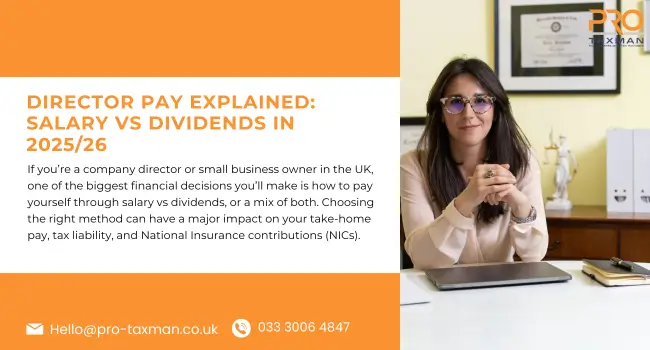If you’re a company director or small business owner in the UK, one of the biggest financial decisions you’ll make is how to pay yourself through salary vs dividends, or a mix of both. Choosing the right method can have a major impact on your take-home pay, tax liability, and National Insurance contributions (NICs).
Let’s explore both options in detail and see which works best for your situation.
What Is a Salary?
A salary is a regular payment you receive from your company as an employee or director. It’s subject to Income Tax and National Insurance Contributions (NICs) through the PAYE system (Pay As You Earn).
Advantages of taking a salary:
- Builds eligibility for state benefits (e.g. maternity pay, pension, and state pension).
- Helps you show consistent income useful for mortgages and loan applications.
- Reduces company profits, which means lower Corporation Tax.
Disadvantages:
- You pay both Income Tax and NICs, making it less tax-efficient overall.
- Requires more administrative work through payroll.
Example: If you take a salary of £30,000, you’ll pay Income Tax above the personal allowance (£12,570) and both employee and employer NICs.
What Are Dividends?
Dividends are payments made to company shareholders from post-tax profits. That means your company must first pay Corporation Tax on its profits, and then you can distribute the remaining profit as dividends.
Advantages of taking dividends:
- Lower tax rates compared to salary.
- No National Insurance on dividend income.
- Simple to declare through your Self Assessment tax return.
Disadvantages:
- You can only take dividends from profits (not losses).
- No pension or benefit contributions apply.
- Requires proper documentation e.g. dividend vouchers and board minutes.
Dividend Tax Rates for 2025/26:
- 8.75% – Basic rate
- 33.75% – Higher rate
- 39.35% – Additional rate
- First £500 is tax-free (Dividend Allowance)
Salary vs Dividends: The Key Differences
| Criteria | Salary | Dividends |
| Tax | Income Tax + National Insurance (NIC) | Dividend Tax only |
| When Paid | Regularly (monthly) | When company has profits |
| Tax Deductible? | Yes, reduces Corporation Tax | No |
| National Insurance | Payable | Not payable |
| State Benefits Eligibility | Yes | No |
| Paperwork | PAYE and payroll | Dividend vouchers and minutes |
| Best For | Regular income, stability | Tax efficiency, flexibility |
Best Option: A Combination of Salary and Dividends
The most tax-efficient pay structure is to combine a small salary with dividends.
For Example:
- Take a salary up to the NIC threshold (£12,570) keeping you eligible for benefits while paying minimal NIC.
- Take the rest of your income as dividends saving on NIC and maximising take-home pay.
This blend helps balance:
- Tax efficiency
- Pension and benefit eligibility
- Simplicity in reporting
FAQs on Salary vs Dividends
1. Can I take only dividends and no salary?
Yes, if your company has profits, but you’ll miss National Insurance credits and certain benefits.
2. Do I need to pay Corporation Tax before taking dividends?
Yes, dividends come from post-tax profits only.
3. Is it illegal to take dividends without profit?
Yes, that’s called an illegal dividend, and HMRC can penalise your company.
4. Should I talk to an accountant before deciding salary vs dividends?
Absolutely! A qualified accountant can calculate the right balance of salary and dividends to maximise your take-home income.
5. How to Avoid Dividend Tax in the UK?
You can’t legally avoid dividend tax in the UK, but you can reduce it using legitimate, HMRC-approved methods.
Here’s how:
- Use your £12,570 personal allowance and £500 dividend allowance.
- Take a small salary and the rest as dividends to reduce National Insurance.
- Split dividends with your spouse if they’re a shareholder to use both allowances.
Final Thoughts
There’s no single right answer to the question of salary vs dividends which is best? It depends on your income level, business profits, and personal goals.
If you want regular income and benefits eligibility, a salary is the way to go.
If you want to maximise take-home pay and reduce tax, dividends are more efficient.
Most UK company directors use a mix of salary and dividends to achieve the best tax-efficient director pay structure.

